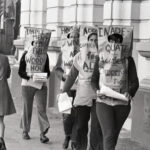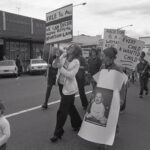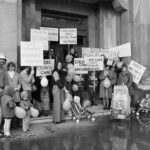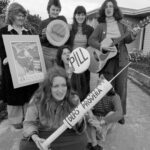Manawatu Exhibition: Women's Rights
Staking out the personal as political
Women’s Liberation groups arose in Wellington (1970) and Auckland (1971), spreading to Dunedin, Christchurch and provincial centres before long. Women in small, non-hierarchical groups throughout New Zealand were soon focusing their energies on personal change and commitment to active feminism. More traditionally structured membership groups, such as the National Organisation for Women focused on women’s political and economic rights. These two different approaches were sometimes dubbed ‘radical’ and ‘liberal’ feminism.
Manawatu Photographs
“A bunch of old bags”, was how the Manawatū Standard jokingly described these local women’s liberation protesters in October 1972. They were drawing attention to workers who were unrecognised by the newly formed Accident Compensation scheme, particularly those who worked in the home, described as ‘housewives’. In 1967 the Crown had set up a Royal Commission to report on workers’ compensation. This led to the Woodhouse report, whose recommendations formed the foundation of ACC.
On Suffrage Day 1973, Palmerston North women (“and two or three men”) marching in support of the right for abortion were joined by anti-abortionists carrying Bible-based placards. At the front of the march the anti-abortion supporters were briefly overtaken by those seeking the repeal of the abortion law, better contraceptive advice and free sterilisation: every child a wanted child.
Undaunted by the rain which prevented a planned march on Suffrage Day 1974, the Childcare Action Group went as a delegation to the mayor, Brian Elwood. The introduction of solo mothers’ benefits in 1973 meant unmarried women could keep their babies. But women’s options were still narrow: neighbours and grandmothers weren’t as available to look after children; childcare — if available at all — was prohibitively expensive. The Childcare Action Group argued that childcare, being the first level of the country’s education system, should be free.
The women’s liberation movement found a natural partner in the performing arts. Hard-hitting satire explored topics of vital concern to women. In August 1976 the Backstreet Theatre Group visited Palmerston North and more than 25 other NZ centres from Auckland to Invercargill. Depo-Provera was an injection providing three months’ contraception. Maggie Eyre is shown administering protection to Sharon Alston. Other performers, from left, are Miranda Coates, Rosemary Wood, with Ruth Mary, and Deborah Filler on the guitar.



